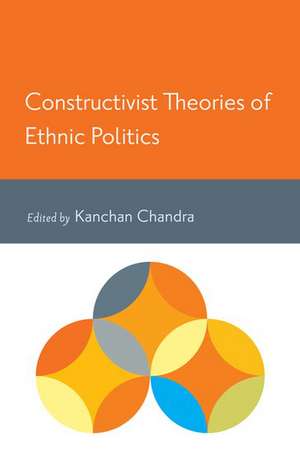Constructivist Theories of Ethnic Politics
Editat de Kanchan Chandraen Limba Engleză Hardback – 25 oct 2012
Preț: 648.45 lei
Preț vechi: 925.82 lei
-30% Nou
Puncte Express: 973
Preț estimativ în valută:
124.08€ • 129.90$ • 102.67£
124.08€ • 129.90$ • 102.67£
Carte tipărită la comandă
Livrare economică 25-31 martie
Preluare comenzi: 021 569.72.76
Specificații
ISBN-13: 9780199893157
ISBN-10: 0199893152
Pagini: 520
Ilustrații: 66 bw figs/9 color figs; 62 tables
Dimensiuni: 239 x 165 x 33 mm
Greutate: 0.87 kg
Editura: Oxford University Press
Colecția OUP USA
Locul publicării:New York, United States
ISBN-10: 0199893152
Pagini: 520
Ilustrații: 66 bw figs/9 color figs; 62 tables
Dimensiuni: 239 x 165 x 33 mm
Greutate: 0.87 kg
Editura: Oxford University Press
Colecția OUP USA
Locul publicării:New York, United States
Recenzii
Gathering resourceful and innovative scholars, Kanchan Chandra has steered the creation of rich analytical essays-not least her own!-that confront the often surprising mutability of ethnic identity. This resonant volume advances fundamental scholarship by fusing a constructivist turn with the development of testable, theoretically-grounded, propositions focusing on mechanisms of transformation and their implications for essential human relations.
This is an impressively sustained contribution towards a rigorously constructivist theory of politicized ethnicity. Kanchan Chandra and her collaborators develop a lucid analytical language and set of models to illuminate the ways in which ethnic identities change in response to political and economic dynamics.
Usually, essential concepts such as 'constructivism,' 'ethnic identity,' or 'state capacity' are understood to be irreducibly fuzzy in definition and idiosyncratic in use. No longer, now that we can read the rigorous and compelling Constructivist Theories of Ethnic Politics. Best of all, Kanchan Chandra provides hope. States can be effective democracies with, or even because of, ethnic heterogeneity if the institutions and practices are appropriately constituted. That is a message of deep importance.
Chandra has done the public service of sorting through the loose and multiple ways that the term ethnicity is used, offering her own very rigorous definition and systematic method of operationalizing the concept. She places her bets on a methodologically individualist approach, whereby individuals mix and match identity-related attributes into different identity packages, depending on circumstances and incentives. Some constructivists will disagree with her choices, but few will deny that she has thought of every angle, issue, and objection, pursuing the logic of her own approach and alternatives vastly more carefully that has heretofore been the case in academic usage, let alone public discourse.
This is an impressively sustained contribution towards a rigorously constructivist theory of politicized ethnicity. Kanchan Chandra and her collaborators develop a lucid analytical language and set of models to illuminate the ways in which ethnic identities change in response to political and economic dynamics.
Usually, essential concepts such as 'constructivism,' 'ethnic identity,' or 'state capacity' are understood to be irreducibly fuzzy in definition and idiosyncratic in use. No longer, now that we can read the rigorous and compelling Constructivist Theories of Ethnic Politics. Best of all, Kanchan Chandra provides hope. States can be effective democracies with, or even because of, ethnic heterogeneity if the institutions and practices are appropriately constituted. That is a message of deep importance.
Chandra has done the public service of sorting through the loose and multiple ways that the term ethnicity is used, offering her own very rigorous definition and systematic method of operationalizing the concept. She places her bets on a methodologically individualist approach, whereby individuals mix and match identity-related attributes into different identity packages, depending on circumstances and incentives. Some constructivists will disagree with her choices, but few will deny that she has thought of every angle, issue, and objection, pursuing the logic of her own approach and alternatives vastly more carefully that has heretofore been the case in academic usage, let alone public discourse.
Notă biografică
Kanchan Chandra is Associate Professor of Politics at New York University.
